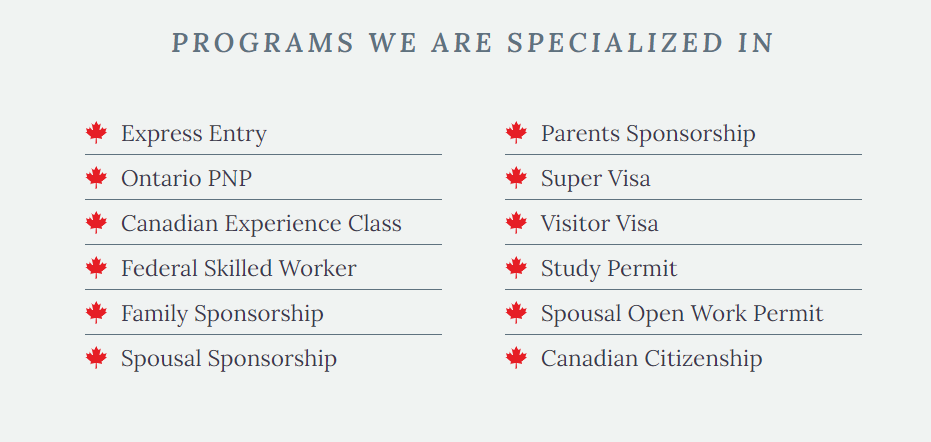
Moving abroad and leaving your loved ones on opposite coast is not easy. One of the objectives of Government of Canada is to see that families are reunited. Certain family members may qualify to settle in Canada long-term and become permanent residents under family class category. After becoming permanent residents, they can live, study and work in Canada, thus you no longer need to apply for visitor visa and provide letter of invitation.
Like other immigration categories, family class sponsorship has certain requirements, such as minimum necessary income which should be met by sponsor. If you are wondering how to sponsor someone to Canada, you should start from reviewing family sponsorship applications, eligibility and requirements.
You may be eligible to sponsor a child, spouse or a common-law partner living outside or inside Canada if you are 18 years of age or older, and you are a Canadian citizen or permanent resident.
When you are sponsoring a family member, whether it is your dependent child or spouse/common-law partner, you promise to support them financially. Therefore, you must work in Canada and meet certain income requirements. Sponsoring a family member to Canada is a big commitment, as you must sign an undertaking agreement. Kindly note, that family sponsorship in Canada is not eligible for a tax receipt. Below you’ll find more information on how to sponsor a relative to Canada, what are family sponsorship income requirements, how you should be sponsoring a child born outside of Canada, as well as surrogacy and immigration considerations.
CAN I SPONSHOR….?

DEPENDENT CHILD
For immigration purposes the age limit of dependent children has changed from “under 19” to “under 22.” This change will apply to all new applications received on or after October 24, 2017. In order to qualify as a dependant, your child must be within the age limit, as well as meet the requirements of a dependent child. Children qualify as dependants if they meet both of these requirements: they’re under 22 years old, and they don’t have a spouse or partner. Children 22 years old or older qualify as dependants if they meet both of these requirements: they have depended on their parents for financial support since before the age of 22, and they are unable to financially support themselves because of a mental or physical condition.

BROTHER OR SISTER
Currently there is no direct sponsorship program for brothers and sisters of Canadian citizens or permanent residents. However, their siblings can apply for permanent residency as economic class immigrants and receive fifteen additional points under Express Entry. There are two other ways for brothers and sisters to apply for immigration under the family class. The first option would include dependent children under parents’ sponsorship. In this case the parent(s) may include their child as a dependent. To qualify as a dependent, sponsored child must meet certain requirements. In some exceptional circumstances brothers and sisters may be sponsored under orphaned close relative program.

ADOPTED CHILD
For international adoptions, you must complete the adoption process and the citizenship or immigration process, before you may bring your child to live with you in Canada. In order to sponsor your adopted child to Canada, it is necessary to apply for Citizenship or Immigration (Permanent Residency). Adopted child receives a direct grant of citizenship through the citizenship process. While, adopted child will receive status of permanent resident through the immigration process. If parents engage in the surrogacy process outside of Canada, newborn is legally the child of the sponsor or their spouse/partner in that jurisdiction, there are different avenues on bringing the child back to Canada.

FRIEND
Currently there is no direct sponsorship program for friend of Canadian citizen or permanent resident. However, friends of permanent residents or Canadian citizens may apply for visitor visa, if they are from non-visa-exempt country. Visa office will ask to submit a letter of invitation from friend living in Canada. The applicant must then send this letter to the Canadian embassy or consulate outside of Canada when he or she applies for a temporary resident visa. A letter of invitation does not guarantee that officer will issue a visitor visa, as there is several criteria used to assess the applicant. Countries whose citizens require a visitor visa to enter Canada can be found on Immigration, Refugees and Citizenship Canada’s website.

RELATIVE
In certain circumstances you may qualify to sponsor your relative under “last remaining relative” exception program. This program allows a permanent resident or citizen of Canada to sponsor any relative (related by blood or adoption) regardless of age, if sponsor doesn’t have any of the below-mentioned relatives in Canada, who are either permanent residents or citizens: spouse/common-law partner, child, parent(s)/grandparent(s), sibling, niece/nephew, aunt/uncle. In addition, sponsor should not have any members of family class (who could be sponsored) outside of Canada. If you sponsor a relative to come to Canada as a permanent resident, you must support your relative financially.

SOMEONE ELSE
Through the Private Sponsorship of Refugees Program, you may be able to help sponsor refugees from abroad who qualify to come to Canada. Your role as a sponsor will be to support the refugees for the length of the sponsorship. This includes help for housing, clothing and food, as well as social and emotional support. There are also many organizations that signed sponsorship agreements with the Government of Canada to help support refugees from abroad when they resettle in Canada. These organizations are called Sponsorship Agreement Holders. They can sponsor refugees themselves or work with others in the community to sponsor refugees. Note, that Quebec has its own process to sponsor refugees.

CONTACT US
SCO 110-111, 2nd Floor, Near
Sindhi Sweets, Sector 17C, Chandigarh, 160017
Email: Info@worldwalkimmigration.com
PRIVACY POLICY
CAREERS AT WORLDWALK
PARTNERSHIP
CURRENCY DISCLAIMER
TERMS OF USE
